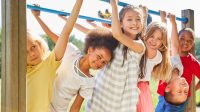This study aimed to relate school diversity approaches to continuity and change in teacher–student relationships, comparing Belgian-majority (N = 1,875, Mage = 14.56) and Turkish and Moroccan-minority adolescents (N = 1,445, Mage = 15.07). Latent-Growth-Mixture-Models of student-reported teacher support and rejection over 3 years revealed three trajectories per group: normative-positive (high support, low rejection) and […]

